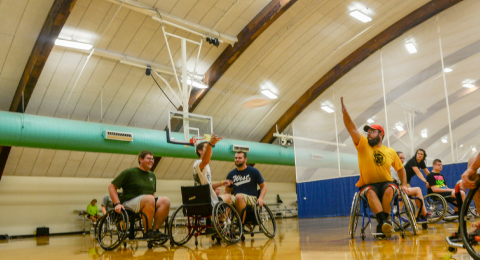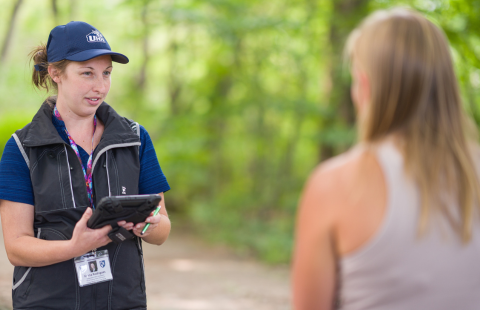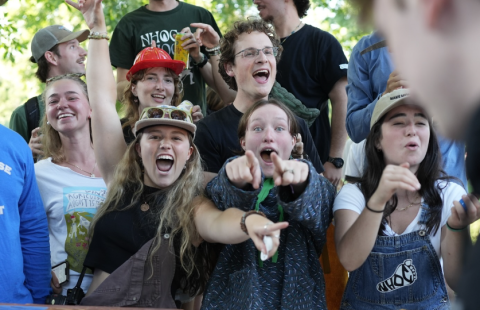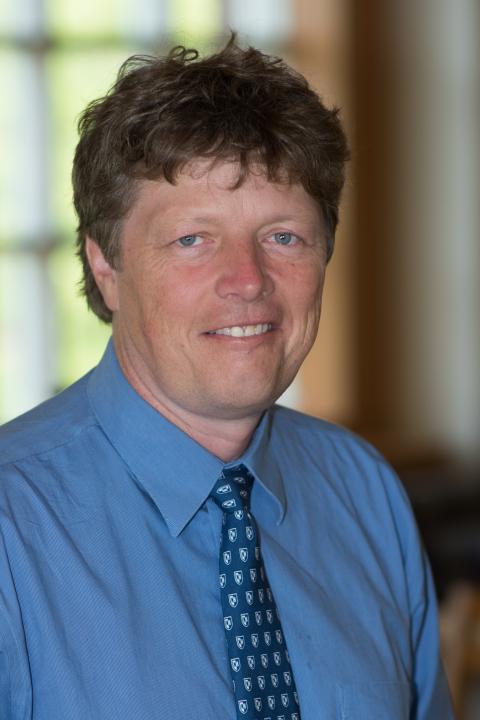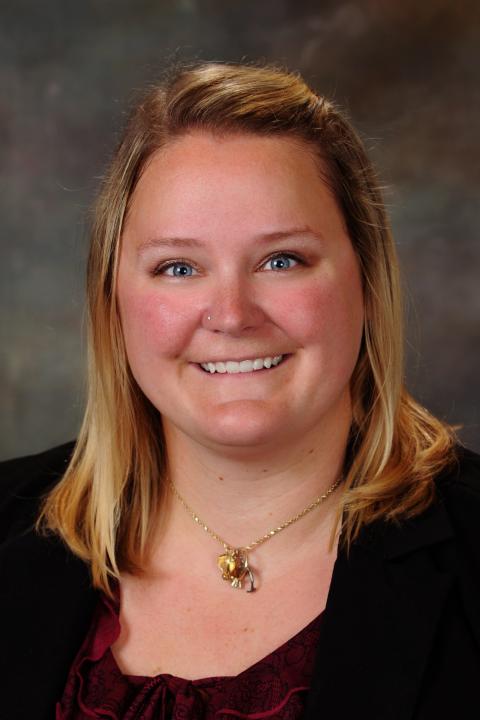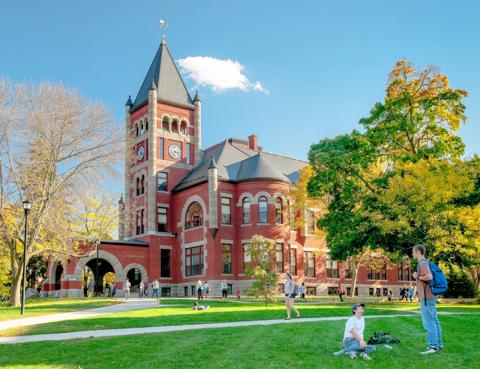Please note: admissions to the Therapeutic Recreation Option (BS) for Fall 2026 are paused. RMP is developing a new interdisciplinary major with a broader Health and Wellness focus, and a Therapeutic Recreation minor that will prepare students for NCTRC certification.
Why Therapeutic Recreation at UNH?
A two-time winner of the American Therapeutic Recreation Association’s “Excellence in Education Award”, the Therapeutic Recreation (TR) option at UNH prepares students for success across the entire spectrum of the profession. Graduates are fully prepared and eligible to take the Certified Therapeutic Recreation Specialist exam and do so with pass rates consistently above the national average. Thanks to a unique partnership with Northeast Passage, students receive hands-on learning opportunities from one of the most renowned Therapeutic Recreation organizations in the nation while engaging in a curriculum that covers the breadth and depth of TR practice.
WHAT IS THERAPEUTIC RECREATION?
Therapeutic recreation is rooted in the belief that purposeful activities can improve the well-being of people of all ages who are facing physical, mental, cognitive or emotional challenges. Working in this rewarding field, you may find yourself helping others through recreational activities as varied as outdoor excursions, sports, arts and craft projects, dance or community events. The therapeutic recreation degree program at UNH will prepare you for work in hospitals, rehabilitation centers, assisted living facilities, schools, mental health programs, and community-based recreation programs that serve children and adults with disabilities.
WHY STUDY THERAPEUTIC RECREATION AT UNH?
You’ll have unique opportunities for fieldwork and research in the therapeutic recreation program at UNH. Our faculty is nationally recognized and the curriculum places an emphasis on observation and applied experiences, including a full-time clinical internship. Our curriculum prepares students for success in a variety of professional settings, including the opportunity to focus on non-traditional treatment settings like schools and community wellness programs. You’ll also have opportunities to work with Northeast Passage, UNH’s award-winning therapeutic recreation program. After completing the program, you’ll be prepared to take the National Council for Therapeutic Recreation Certification examination to become a Certified Therapeutic Recreation Specialist. The therapeutic recreation program is accredited by the Committee on Accreditation of Recreational Therapy Education and received the 2017 American Therapeutic Recreation Association Excellence in Education award.
POTENTIAL CAREERS
- Adaptive sports specialist
- Assisted living activities coordinator
- Morale, welfare and recreation (MWR) director
- Recreational therapist (physical rehabilitation, mental and behavioral health, schools, skilled nursing facilities, public parks and recreation)
- Veteran services provider
- Youth program coordinator
From the CHHS Blog
Curriculum & Requirements
Therapeutic recreation utilizes recreation to assist people with disabilities or illnesses to develop and use their leisure in ways that enhance health, independence, and well-being. Therapeutic recreation recognizes the importance of quality of life and uses activities to remediate or rehabilitate functional abilities. Therapeutic recreation services are provided in a variety of settings, including hospitals, long-term care facilities, residential treatment facilities, schools, home health care, community recreation, correctional facilities, rehabilitation centers, camp and outdoor education centers, and adult day programs. Observation and applied experience is a component of several courses. Students complete a 14-16-week full-time clinical internship under the supervision of a certified therapeutic recreation specialist (CTRS). The Bureau of Labor Statistics occupational outlook reports the "employment of recreational therapists is projected to grow 8 percent from 2019 to 2029, which is much faster than the average for all occupations. As the large baby-boom generation ages, they will need recreational therapists to help treat age-related injuries and illnesses, such as strokes. Recreational therapists will also be needed to help patients manage chronic conditions such as diabetes and obesity (Bureau of Labor Statistics). A CNN Money report identifies recreation therapy among the top ten "best jobs for saving the world." In particular, they note the profession's high benefit to society and high personal job satisfaction (CNN Money Magazine).
Upon successful completion of this option, students are prepared to meet sitting requirements for the National Council for Therapeutic Recreation Certification Examination. Students/graduates who pass the NCTRC exam and attain the CTRS are eligible to seek licensure to practice in the state of New Hampshire.
Students may be required to submit to a criminal background check.
Sample Degree Plan
This sample degree plan serves as a general guide; students collaborate with their academic advisor to develop a personalized degree plan to meet their academic goals and program requirements.
| First Year | ||
|---|---|---|
| Fall | Credits | |
| BMS 507 | Human Anatomy and Physiology I | 4 |
| RMP 490 | Recreation & Tourism in Society | 4 |
| PSYC 401 | Introduction to Psychology | 4 |
| ENGL 401 | First-Year Writing | 4 |
| Credits | 16 | |
| Spring | ||
| BMS 508 | Human Anatomy and Physiology II | 4 |
| RMP 501 | Diversity, Equity, Inclusion, and Justice for Recreation Services | 4 |
| Statistics Course | 4 | |
| Discovery Course | 4 | |
| Credits | 16 | |
| Second Year | ||
| Fall | ||
| RMP 502 | Foundations of Therapeutic Recreation | 4 |
| RMP 500 | Therapeutic Recreation Methods in Physical Rehabilitation Settings | 1 |
| RMP 503 | Therapeutic Recreation Rehabilitation Principles & Interventions | 4 |
| RMP 563 | Recreation Management and Policy Practicum | 2 |
| Discovery Course | 4 | |
| Credits | 15 | |
| Spring | ||
| RMP 557 | Program and Event Design | 4 |
| RMP 504 | Therapeutic Recreation Mental Health Principles and Interventions | 4 |
| RMP 505 | Therapeutic Recreation: Aging Services Principles & Interventions | 4 |
| Discovery Course | 4 | |
| Credits | 16 | |
| Third Year | ||
| Fall | ||
| RMP 612 | Therapeutic Communication and Facilitation Techniques in Therapeutic Recreation | 4 |
| RMP 613 | Interventions and Documentation in Therapeutic Recreation | 3 |
| HDFS 525 | Human Development | 4 |
| RMP 654 | Professional Development and Ethics | 2 |
| Discovery Course | 4 | |
| Credits | 17 | |
| Spring | ||
| RMP 614 | Assessment and Treatment Planning in Therapeutic Recreation | 4 |
| RMP 615 | Clinical Lab in Therapeutic Recreation | 2 |
| PSYC 561 | Psychopathology | 4 |
| Discovery Course | 4 | |
| Discovery Course | 4 | |
| Credits | 18 | |
| Fourth Year | ||
| Fall | ||
| RMP 764 | Internship | 12 |
| Credits | 12 | |
| Spring | ||
| RMP 724 | Research, Evaluation, and Data-Driven Decisions | 4 |
| RMP 663 | Management and Finance in the Experience Industry | 4 |
| TR Elective | 4 | |
| Discovery Course | 4 | |
| Elective Course | 2-4 | |
| Credits | 18-20 | |
| Total Credits | 128-130 | |
Degree Requirements
All Major, Option and Elective Requirements as indicated.
*Major GPA requirements as indicated.
Major Requirements
All majors must complete a core curriculum.
| Code | Title | Credits |
|---|---|---|
| Core Requirements | ||
| RMP 490 | Recreation & Tourism in Society | 4 |
| RMP 501 | Diversity, Equity, Inclusion, and Justice for Recreation Services | 4 |
| RMP 557 | Program and Event Design | 4 |
| RMP 563 | Recreation Management and Policy Practicum | 2 |
| RMP 654 | Professional Development and Ethics | 2 |
| RMP 724 | Research, Evaluation, and Data-Driven Decisions | 4 |
| RMP 764 | Internship (Capstone) 1 | 12 |
- 1
A supervised internship is required for all RMP students and serves as the major capstone requirement. The internship is designed to create a bridge between theory and practical application. Students, working with their advisors and the internship coordinator, select an appropriate setting based on their professional and career interests. Students in the Therapeutic Recreation option must complete a 12-credit, 560-hour internship which ranges from 14 to 16 weeks and is under the supervision of a Certified Therapeutic Recreation Specialist. Specific requirements are identified in the Internship Manual available from the Department of Recreation Management and Policy.
| Code | Title | Credits |
|---|---|---|
| Therapeutic Recreation Option Requirements | ||
| RMP 500 | Therapeutic Recreation Methods in Physical Rehabilitation Settings | 1 |
| RMP 502 | Foundations of Therapeutic Recreation | 4 |
| RMP 503 | Therapeutic Recreation Rehabilitation Principles & Interventions | 4 |
| RMP 504 | Therapeutic Recreation Mental Health Principles and Interventions | 4 |
| RMP 505 | Therapeutic Recreation: Aging Services Principles & Interventions | 4 |
| RMP 612 | Therapeutic Communication and Facilitation Techniques in Therapeutic Recreation | 4 |
| RMP 613 | Interventions and Documentation in Therapeutic Recreation | 3 |
| RMP 614 | Assessment and Treatment Planning in Therapeutic Recreation | 4 |
| RMP 615 | Clinical Lab in Therapeutic Recreation | 2 |
| RMP 663 | Management and Finance in the Experience Industry | 4 |
| TR Elective 2 | ||
| Select one course from the following: | 4 | |
RMP 720 | Adaptive Sport Facilitation for Recreation Therapy and Related Professions | |
RMP 740 | Therapeutic Recreation Service Delivery in Community Settings | |
| Required Support Courses | ||
| BMS 507 | Human Anatomy and Physiology I | 4 |
| BMS 508 | Human Anatomy and Physiology II | 4 |
| HDFS 525 | Human Development | 4 |
| PSYC 561 | Psychopathology | 4 |
| Statistics Course | ||
| Select one course from the following: | 4 | |
PSYC 402 | Statistics in Psychology | |
SOC 402 | Statistics | |
| Total Credits | 90 | |
- 2
Or other TR related courses as approved by Academic Advisor. RMP students enrolled in an accelerated masters program offered by the Carsey School of Public Policy may count any Carsey graduate course as an elective toward their undergraduate RMP degree.
Program Learning Outcomes
- Students will integrate an understanding of history, service models, theory/philosophy, ethics, credentials, professional conduct, evidence-based practice and professional development with Recreational Therapy (RT) practice.
- Students will develop competence to individually screen, assess and systematically collect comprehensive and accurate data about patients/clients in an efficient and effective manner and to analyze the data collected to determine the course of actions subsequent to an individualized treatment/program plan.
- Students will develop competence in the planning and development of individualized treatment plans that identify functional outcome goals, modalities, facilitation techniques and interventions based on assessment data collected and evidence regarding the diagnosis and treatment of specific medical, psychiatric and other disabling conditions.
- Students will know how to use structured, systematic and evidence-based treatment interventions and facilitation techniques to improve patient/client functioning and independence in life activities.
- Students will develop competence to implement the individualized treatment/program plan using appropriate evidence-based treatment interventions and programs to restore, remediate, or rehabilitate patient/client functioning as well as to reduce or eliminate the limitations to participation in life activities resulting from medical, psychiatric or other disabling conditions.
- Students will acquire specific modality/skills and facilitation techniques used as treatment interventions in Recreational Therapy practice.
- Students will systematically conduct evaluation and research to determine the effectiveness of treatment interventions and programs used to reach patient/client outcomes.
- Students will develop the competencies to manage a Recreational Therapy practice, department, and staff.
- Students will develop an understanding of human anatomy and physiology, growth/development, psychology, functioning in life activities and an understanding of health care services to serve as a foundation for Recreational Therapy practice.
- Students will develop entry-level clinical proficiency and professional behavior through field-based clinical opportunities in accordance with professional standards of practice in Recreational Therapy
Professional Licensure/Certification Disclosures
The University of New Hampshire offers a number of academic programs designed to lead to professional licensure or certification in New Hampshire. However, completing a UNH degree/program does not guarantee professional licensure or certification. Eligibility may also depend on factors like years of work experience, professional examinations, passing a background check, and other criteria.
UNH does not guarantee that its professional licensure programs will satisfy the criteria of professional licensure boards in other states. Some states maintain different requirements for professional licensure or certification and requirements can change frequently. Federal regulations require the University to make public disclosure of certain information regarding professional licensure or certification programs, regardless of the modality the program is offered (i.e., in-person or online). The University provides guidance below but recommends students contact their state/territory licensing or certification board to ensure a program meets specific state/territory requirements.
Visit the Office of the Registrar's website for information about whether this program meets professional licensure requirements in your state.
Explore Program Details
Broadly, the Department of Recreation Management and Policy's (RMP) mission is to advance the intellectual and professional development of students, and to promote health, quality of life, and sustainable environments through excellence in teaching, research, and public service. This aspect of our mission encompasses both the program administration and the therapeutic recreation options.
Further, the central mission of the therapeutic recreation option at UNH is to develop competent RT/TR clinicians for the 21st Century health care. We are committed to ensuring that our students develop not only knowledge, skills, and abilities that ensure competent practice, but also to inculcate our graduates with an ethos of commitment to collaboration, mentoring, and advancement of the profession.
Central Mission of the TR Option:
Develop competent RT/TR clinicians for 21st Century Health Care
In so doing, we strive to:
- Prepare competent entry-level recreational therapists in the cognitive (knowledge), psychomotor (skills), and affective (behavior) learning domains
- Sustain a network of exemplary clinicians committed to service, mentoring and teaching
- Promote the enculturation of students and alumni in an ethos of working together
Students interested in our Recreation Management and Policy and Therapeutic Recreation major may also be interested in these advanced degree offerings:
